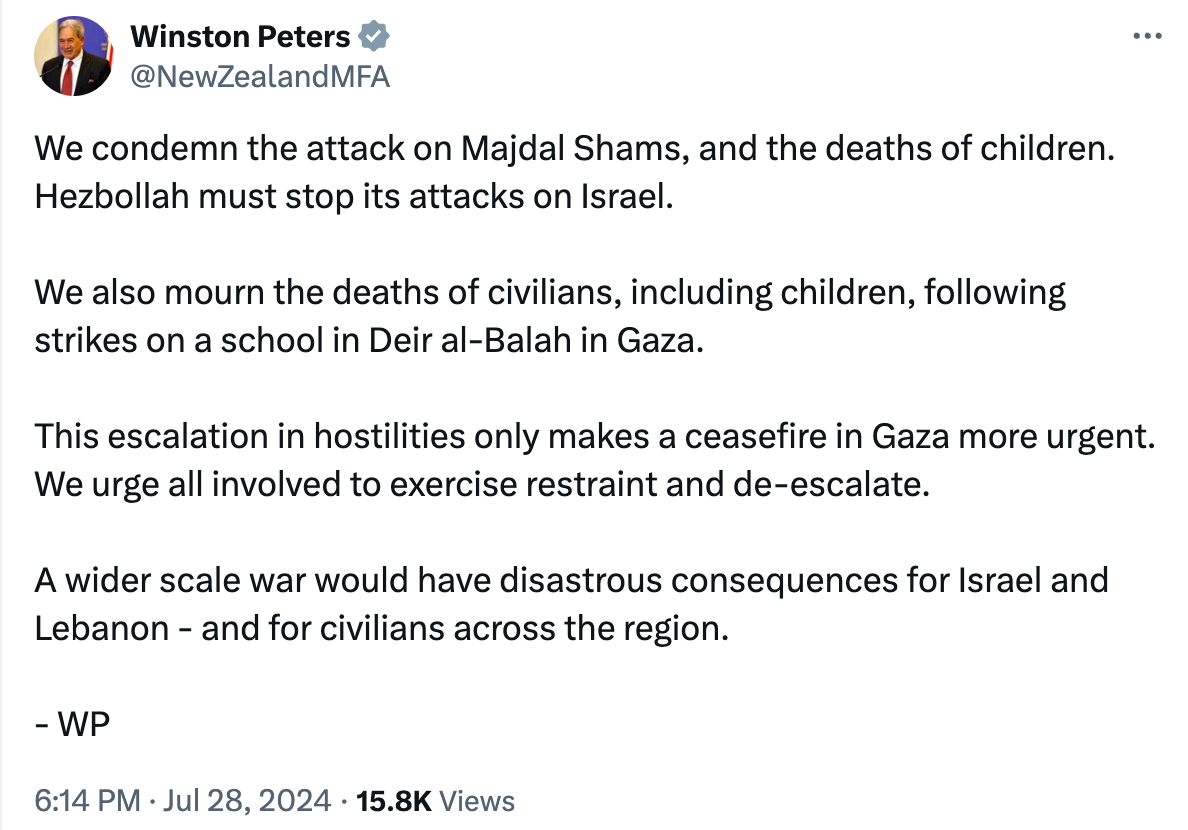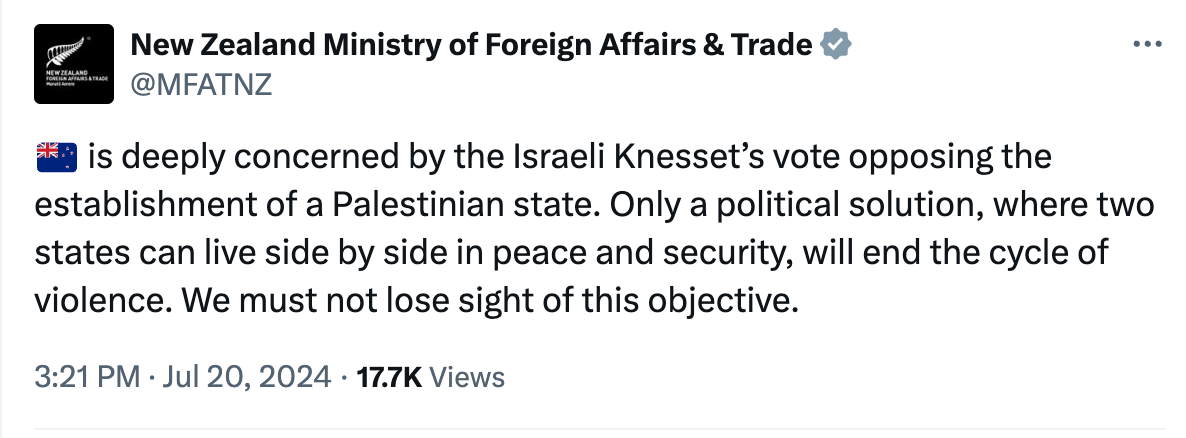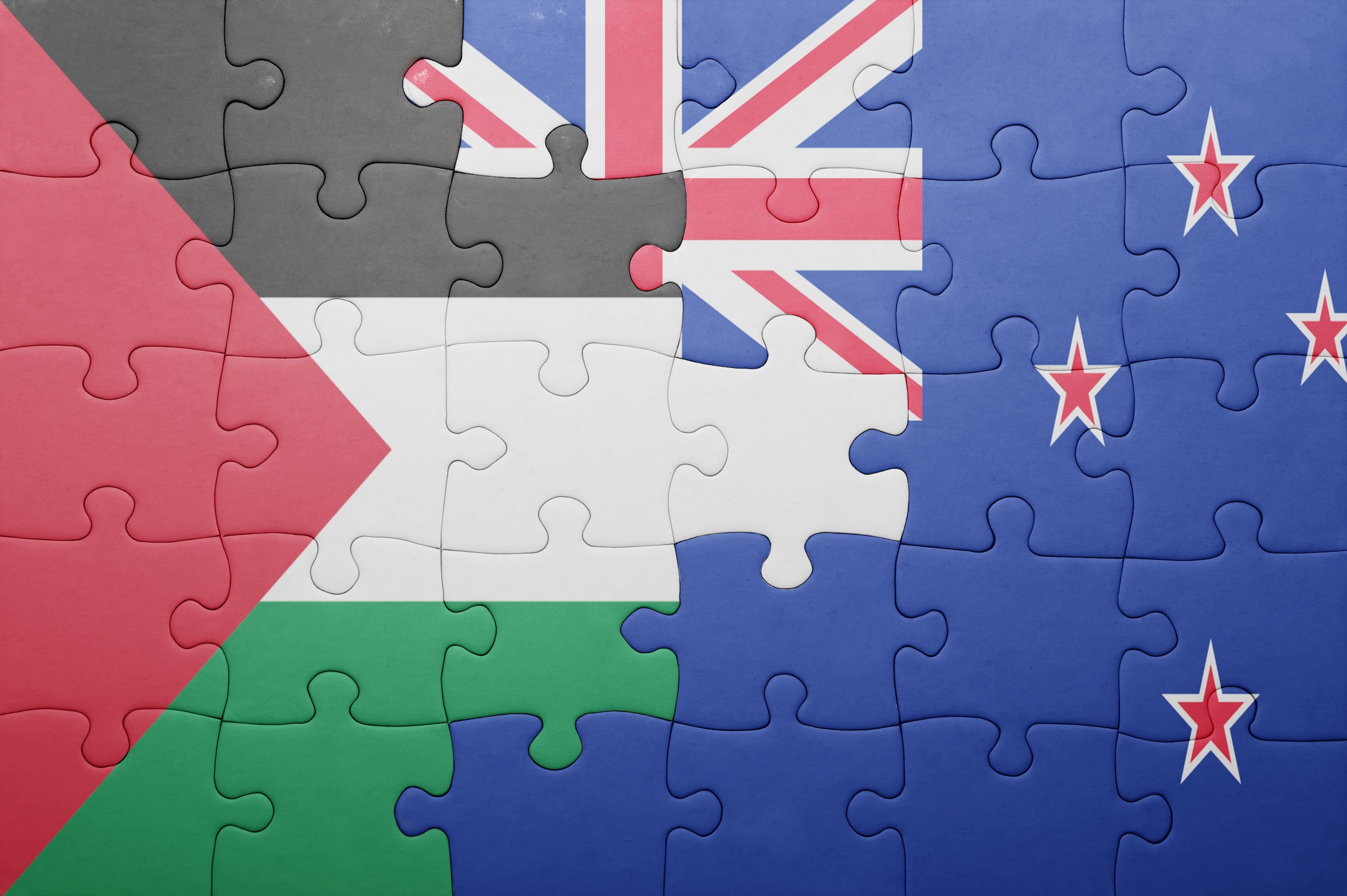Table of Contents
Republished with Permission
Geoffrey Miller
Geoffrey Miller is the Democracy Project’s geopolitical analyst and writes on current New Zealand foreign policy and related geopolitical issues.
As tensions in the Middle East rise further, New Zealand’s approach to the region continues to evolve.
Neither Prime Minister Christopher Luxon nor foreign minister Winston Peters were immediately keen to comment publicly about Israel’s assassination of Hamas political leader Ismail Haniyeh in Tehran.
On social media, Luxon instead promoted the government’s recently introduced tax cuts, while Peters posted on the launch of a new shortwave radio transmitter for Radio New Zealand’s Pacific-focused service, a key plank of Wellington’s public diplomacy efforts.
But it would be wrong to call New Zealand reticent when it comes to the war in Gaza as a whole.
Indeed, Peters was quick to publicly condemn last weekend’s attack by Hezbollah on Majdal Shams in the Golan Heights, killing at least 12 children. The assault has fuelled the latest round of Middle East escalation. On X, Peters said the rising tensions meant a ceasefire was ‘more urgent’ and called on ‘all involved to exercise restraint and de-escalate’.

And Peters has often talked frankly about the deteriorating Middle East situation, even in speeches that have mainly focused on other matters. During a visit to Tokyo in July, for instance, Peters spoke of the ‘utter catastrophe still unfolding in Gaza’ that had ‘further destabilised global security’.
In May, New Zealand’s foreign minister issued a statement calling for an ‘immediate cessation of armed conflict, the release of hostages, and a focus on meeting the immediate humanitarian needs of the people in Gaza’. Meanwhile, in a broader address to the New Zealand Institute of International Affairs (NZIIA) the same month, Winston Peters said Wellington was ‘deeply concerned that miscalculation by either Israel or Iran could widen the conflict’.
Peters was speaking after unprecedented direct strikes between Iran and Israel in April. But his words remain just as relevant today, following Majdal Shams and Israel’s subsequent targeted killings of Hezbollah commander Fuad Shukur in Beirut and Hamas’ Ismail Haniyeh in Tehran.
At leader level, Christopher Luxon has also spoken out strongly at times. In late July, the New Zealand PM released a new joint statement with his counterparts from Australia and Canada. The statement was the third of its kind and followed similar combined calls by Canberra, Ottawa and Wellington in December and February.
But this time, the statement was unusually blunt, and focused heavily on the prospect of the situation becoming even worse. The trio said they were ‘gravely concerned about the prospect of further escalation across the region’ and wanted to avoid a war between Hezbollah and Israel that could ‘put tens of thousands of civilians in Lebanon and Israel at risk’.
There have also been occasions when New Zealand’s chief foreign policymakers have preferred to keep a low profile. Two examples of this came in July, when Peters – who runs a dedicated social media account for his foreign affairs portfolio on X – chose to leave the expression of particular criticisms of Israel up to an organisational account run by New Zealand’s Ministry of Foreign Affairs and Trade (MFAT).
In the posts, New Zealand condemned Israel’s planned legalisation of five settlements in the West Bank and a resolution passed by the Knesset that opposed a Palestinian state.

Of course, while Wellington’s words are important, it is arguably even more important to look at its actions.
To this end, it is worth considering the travel patterns of both Winston Peters and Christopher Luxon over the past nine months. Both men have maintained – at least by New Zealand standards – a relatively busy international schedule. Peters has visited around 30 countries since taking office in November 2023, while Luxon has visited no fewer than nine countries over the same period.
Of these trips, only two have been to the wider Middle East, both by the foreign minister and both in April. Winston Peters met with his Egyptian counterpart Sameh Shoukry on a brief stopover in Cairo on the way to Europe and the United States, while he also visited Türkiye later the same month to represent New Zealand at annual commemorations marking the country’s participation in World War I.
These trips were undoubtedly valuable in learning the views of regional actors. Egypt borders Gaza and continues to play a major role in efforts to broker a ceasefire between Hamas and Israel. And while in Istanbul, New Zealand’s foreign minister held talks with Turkish President Recep Tayyip Erdoğan, in addition to Peters’ direct counterpart, Hakan Fidan.
But overall, both Christopher Luxon and Winston Peters have clearly focused their attention on the Indo-Pacific. New Zealand’s prime minister and foreign minister have both made high-profile trips to the United States, while, in Asia, they have each visited Japan, the Philippines and Singapore. In the Pacific, shared destinations include Fiji, Niue [and] Papua New Guinea. Meanwhile, Winston Peters has visited many other ASEAN and Pacific Islands Forum members.
Of course, more ministers are involved in New Zealand’s foreign policy than just the foreign minister and prime minister. For example, trade minister Todd McClay has visited the Gulf states at least three times, with Saudi Arabia and United Arab Emirates (UAE) a particular focus. While McClay’s trips are officially about trade, the visits will have also provided McClay with useful wider regional insights that he can share with his cabinet colleagues back in Wellington.
Still, the missing link in the picture is a dedicated fact-finding mission or two by Winston Peters to the Middle East, with the purpose of learning the views of more key regional actors. By doing so, Peters would be following to some extent in the footsteps of Penny Wong, his Australian counterpart who toured Israel, the West Bank, Jordan and the UAE over a week in January.
For Peters, the natural place to start would be the Gulf, to which New Zealand recently extended a Bahrain-based deployment of six military personnel to Operation Poseidon Archer, the US-UK led bombing campaign against Yemen’s Houthi movement in response to the group’s attacks on commercial shipping in the Red Sea.
Elsewhere in the Gulf, Qatar would be another obvious stopping point for Peters, given Doha’s central role in mediation efforts. And Oman and Kuwait – two other Gulf Cooperation Council (GCC) members – would also have useful experiences and views to share with Wellington, given their geopolitical positioning and interests.
Like so many before it, New Zealand may be understandably wary of getting its fingers burned by seeking to become more involved in the Middle East’s problems. But remaining on the sidelines carries its own risks: quite aside from the moral dimension, turmoil in the Middle East has already distracted global attention from the issues faced by the Indo-Pacific.
No one is suggesting that New Zealand can single-handedly bring peace to the Middle East.
But by working in concert with others, both inside and outside the region, it can certainly play its part.
This article was originally published by the Democracy Project.









